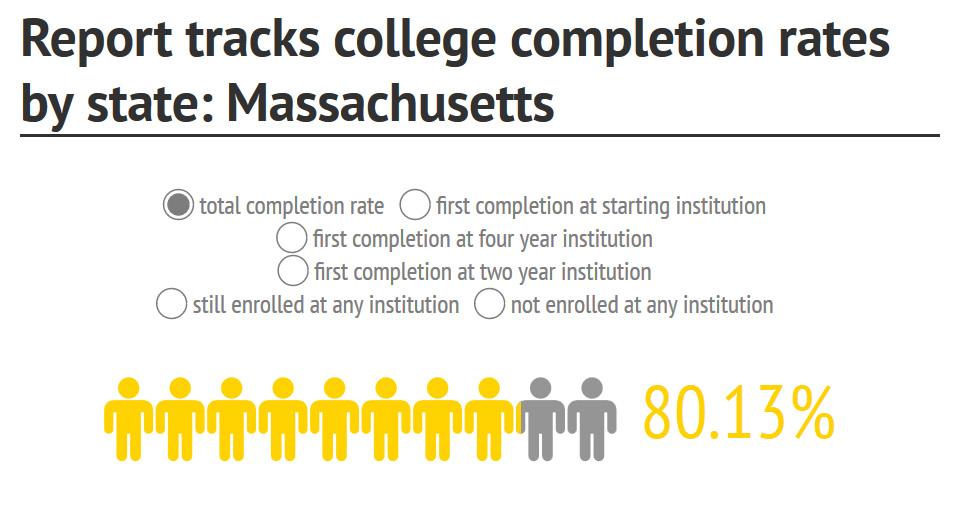College completion rates at private institutions in Massachusetts surpass the national average, a Monday report from the National Student Clearinghouse Research Center found.
The report focuses on six-year graduation outcomes for first-time students that began college in 2008. For four-year private nonprofit institutions, Massachusetts had a completion rate of 80.13 percent compared to the national rate of 73.57 percent, the report stated.
Afet Dundar, associate director of the National Student Clearinghouse Research Center, said the study should allow for policy makers and institutions to assess their personal educational situation and make improvements for the future.
“We are hoping … that the stake holders or the policy makers or institutions will really respond to the ‘why?’ question,” she said. “We are really hoping that we will enable a lot of good discussion, informed discussion about why the numbers are as they are.”
Overall six-year outcomes, which includes two- and four-year colleges, public and private schools and non- and for-profit organizations is 55.03 percent, the report stated.
Farouk El-Baz, director of the Center for Remote Sensing at Boston University, said Massachusetts ranks near the top of the list because universities throughout the Commonwealth seek out students who have definitive education goals, while other parts of the country may not place as much importance on the subject.
“Most of the universities in the Midwest, the students begin without really knowing exactly what it is they want to do,” he said. “In the Northeast, the implication of colleges is that they are very tough, and they are hard to get in to, and they definitely attract people who know how to focus.”
Boston University spokesman Colin Riley said Massachusetts schools such as BU provide a high quality education that is worth the investment.
“If you’re making an investment, you’re a student here,” he said. “Your parents are making an investment in you by providing this education, and you want it to come to fruition. The good news at BU is, in the vast majority of students, it does.”
Riley said BU has posted low attrition rates, in turn leading to graduation rates that have increased incrementally over the past 20 years.
“It reflects well on the quality of education here at BU and other private, independent schools here in Massachusetts,” he said.
The overall U.S. completion rate for students at four-year public institutions is 62.85 percent, the report stated. For Massachusetts, the completion rate is 68.06 percent.
El-Baz said the view that a private university may not be as good as a public one needs to be proven wrong.
“In many ways, we need to show that private institutions are just as good as public-supported institutions, if not better. Indeed, the numbers show that they are better, and Boston University is one of those,” El-Baz said.
Several students said they were not surprised by the results of the survey because they view Massachusetts as a strong state for higher education.
Alex Benitez, a freshman in the College of General Studies, said Massachusetts has many excellent schools, including BU.
“We probably have one of the biggest graduation rates in Boston,” he said. “Number-wise it just makes sense … If anything, it’s good.”
Shriya Reddy, a freshman in the College of Arts and Sciences, said she chose to come to Boston because it has a reputation as a center for higher education.
“Part of why I came to Boston was that … you have some of the best opportunities you can possibly find in the entire nation here,” she said. “Being in this hub of knowledge, it has a huge influence on the education here.”
Chantal Gish, a sophomore in the School of Hospitality, said BU is a large institution, so its students may contribute to the high college completion rates in Massachusetts.
“We’re a really big institution … and from what I know, our graduation rate is pretty high,” she said. “Just because of massive numbers, probably we’ve had an impact.”
J.D. Capelouto contributed to the reporting of this article.
























































































































